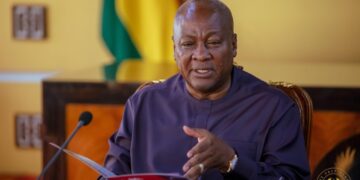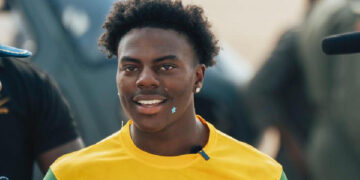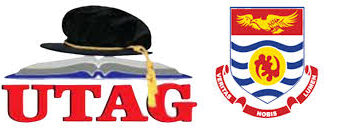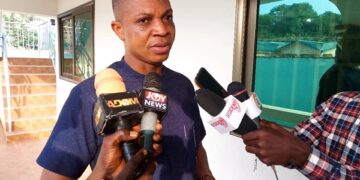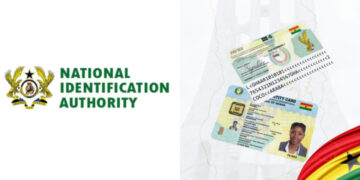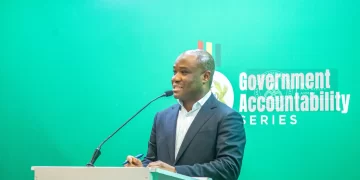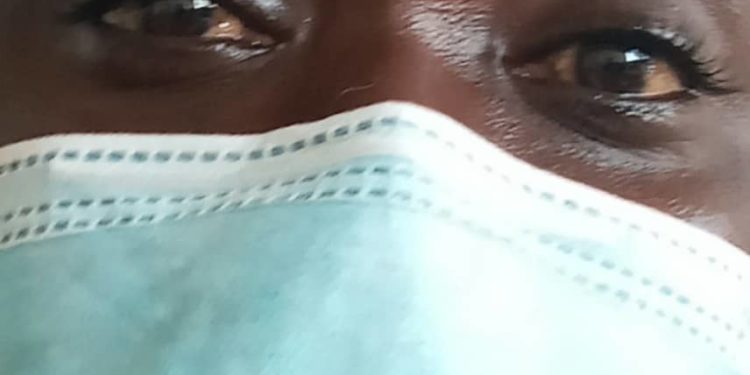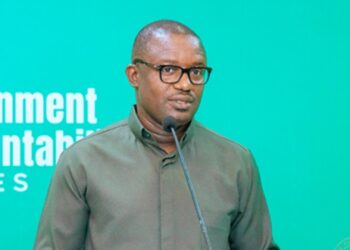Credit: Mary Ama Bawa
Observer reports show that IUU offences are still rife in Ghana’s waters; an incontrovertible evidence which contradict the position of the FC that offences such as the prohibited gear type and size, fishing in the IEZ and dumping of small pelagic fish stock have abated.
It is a Friday morning in Tema, the busy port city of Ghana, in the Greater Accra Region. It is mildly sunny, with a calm breeze of cold wind blowing over my face. Here I sit, eagerly soaking in the somewhat chilling story of 35 years old Kwame, an observer of one of the trawl vessels in Ghana. Kwame, a father of two, completed polytechnic education in 2011 with an ambition of becoming an engineer. He signed up with the Monitoring, Control and Surveillance Division (MCSD) of the Fisheries Commission in 2015 as an observer after 4 years of unsuccessful job hunt. The observer tells me it has been a journey of mixed feelings as every trip to sea comes with chilling reflections. Kwame’s job is a treacherous one. “I watch the thief steal all that belongs to us. I don’t have the power to stop him but only to take pictures and videos of his dealings as evidence that he stole”, he says.
According to Kwame, no job places one in a more vulnerable and precarious position than the fishery observers. “I spend nights with these Chinese on the lonely sea, I stand the risk of being poisoned or drowned. Knowing this so well, can I report all that I see and be safe?
Kwame articulates that though he has never taken any incentive from vessel owners in return for favourable report, he’s unable to report accurately. “They know they are committing all the infractions, but you become a target if you report all that you see; and they know how to get you. On land, they can plot against you and make it seem as if your death was an accident. They will stop any attempt that seeks to implicate them”.
The observer programme in Ghana’s waters has been characterized by harrowing stories of abuse, battery and in some instances, death. In July 2019, one Emmanuel Essien went missing at sea and investigations by the police have not been able to unravel his mysterious disappearance.
As he rested his entire body weight on a very weak falling tree, waiting for his crew to embark on this voyage that may take about nine weeks before returning home, 29 years Eric, also an observer, reflects on the reality of his work. I asked what he told his family before leaving home. “I told them I will return soon and that makes me sad and fills me with lot of chills {because} someone said same and never returned”.
Recounting his own experiences, Eric says to be beaten by the Chinese is the least punishment;“When you’re taking a video, they don’t want to be captured on camera so that they can subsequently deny the evidence in court. If you go ahead to capture, they become very hostile and cruel to the extent of beating you, but that is better, because they can choose to poison you. This makes me scared because human beings are full of surprises”.
Ghana is one country in West Africa that has experienced massive act of looting of its sea resources. For instance, a 2019 research conducted by the Environmental Justice Foundation revealed that in 2017 alone, the illegal trade of saiko took around 100,000 tonnes of fish, costing Ghana millions of dollars in revenue and threatening food security and coastal livelihoods. A previous study estimated that between 11 and 26 million tonnes of fish, valued at US$10-23 billion, are caught annually across the globe via illegal, unreported and unregulated (IUU) fishing.
In Ghana, this has been the development since the year 2000, a situation which subsequently prompted the European Union in 2013 to issue a warning that Ghana risked facing a ban on the export of fish to Europe if it failed to address IUU fishing.
This action led government in 2015 to launch the fisheries management plan to provide a strategic framework for reversing the declining trend of fish resources. A $50m credit facility from the World Bank enabled Ghana, among other things, to place an observer on every industrial trawler, to collect data and report violations to the Fisheries Commission (FC). Describing the mandate of vessel observers, deputy Director of MCSD, Richard Yeboah says that “the observers are to record in detail every activity of vessels such as net size, fish species and how they are caught, how much and what kind of fish is disposed of, the interactions of trawl vessels with sister vessels”. He says this is important because some trawl boats buy fuel and other goods from vessels on the sea, which he describes as “illegal if it is not a designated vessel by the Ghana Maritime Authority or Ghana Ports and Harbours Authority since they evade tax”.
SYSTEM CHALLENGES
The myriad of illegal fishing has become a very lucrative business among trawl vessels in Ghana. Though the fishery laws of the country prohibit these illegal practices and accordingly spell out stringent forms of punishment for offenders, the practices fail to abate for reasons of non-compliance, weak systems and undue influence by political actors who favour operators of trawl vessels and their illegal activities against state agencies who are mandated by the laws to act in the best interest of the country. For instance, information available to this investigation, which has been confirmed by the Ghana Inshore Trawlers Association (GITA) and members of Saiko operators in Elmina and Apam indicates that in 2017, when the sector cracked the whip and threatened to end Saiko, operators of this illegal trade in the Central Region together with some political actors raised the concern that the uncompromising position of the Ministry in fighting Saiko was going to affect the electoral fortunes of the government in the 2020 presidential and parliamentary elections. Fearing the consequences, the sector accordingly relaxed its stance to give space to both trawlers and Saiko operators to go back to business. Following this development, government, in 2018 committed GITA to pay for the services of observers, an obligation which hitherto was singularly borne by the government of Ghana.
To this, the sector Minister then, Elizabeth Afoley Quaye in an earlier interview explained that what is paid to the observers “is part of the license fees that is to be paid to the government of Ghana and that must not be mistaken to mean that the observers are paid by GITA”. GITA disagrees with this position by the Minister and contends that the observers are paid 60 Cedis per day by the Association. Sources say when the proposal came before GITA to absorb the cost of remunerating observers, the Association raised the objection that these were civil servants whose responsibilities were government’s. It said the“FC later devised the strategy that government will pay for the services of only 12 observers and that a vessel without an observer will be prevented from sailing”. This decision by the Commission accordingly compelled the Association to give in to pay for the services of all trawl vessel observers, as failure to do so meant a number of their vessels will be unable to operate.
The credibility of Observers’ reports has also been questioned by many including the MCSD as a major challenge of the Commission. Richard Yeboah says “a whole lot of the observers have been compromised where some of them receive financial perks and favours from captains and vessel owners and are therefore unable to report what they see.”
The Fisheries Director, Arthur Dadzie is apprehensive that reports by some observers are highly exaggerated and may not fly before the law courts if the Commission rides solely on them without the proper investigations.
Aside these disquieting concerns, fishery scientist at the University of Cape Coast, Prof. Kobina Yankson is of the view that after 5 years of its commencement, the country is yet to see any major benefit of the observers programme. He questions “the scientific bases behind this programme”and concludes the programme rather endangers the lives of Observers; “Putting one solitary young man on a trawler with these unfriendly Chinese crew on board, how will this person operate, what is he observing, what kind of evidence do you expect him to bring, will they allow him to take photograph of the things they are doing”?
The Surveillance Division however mounts a strong defense that many IUU offences have taken a tailspin due to the effective implementation of the programme. The Division cites examples such as the prohibited gear type and size, fishing in the Inshore Exclusive Zone (IEZ) and dumping of small pelagic fish stock as illegal practices that have abated as a result of reports submitted by observers on the trawl vessels.
These notwithstanding, Prof Yankson says; “I haven’t seen the abatement of the saiko menace since the inception of the observer programme. Saiko is still going on at the shores of Elmina and Apam which are the core areas. And there is still saiko fish on the market. Local fishers are still being deprived of their livelihood”.
The division acknowledges that the presence of the observers has not stopped the practice of saiko. “The observers are reporting that the vessels come and they take fish. They record the quantity of fish that the saiko vessels take and we have records of all that”. He however adds that the “observer programme as far as saiko is concerned is just one aspect of the solution”and calls on all to be involved as “the regulator is doing its best but it is the responsibility of all to provide information on saiko activities that may not be recorded by the observers”.
With clinched fist against a possible unseen threat or enemy, Eric, in a very depressing mood says there has to be an immediate intervention by government to safeguard Ghana’s waters or risk losing the entire sector. “I know how much fish they take from the sea. Our leaders should open their eyes and understand that these Chinese are in our waters for money. The way and manner they scramble for our fish is dangerous. There is no future for us in the sea when you consider their actions”.
OWNERSHIP CHALLENGE
Ghana has a registered trawler fleet of 74 vessels and nearly all are foreign-owned, and being fronted by Ghanaian companies, according to a source in the FC member of GITA who speaks on anonymity says operators are not in breach of the law and calls on the “FC to enforce the law if it has records of any breach of the fishery laws among its members”. The President of GITA further argues that as a law-abiding association protecting the interest of vessel operators, it is mindful of the boundaries of the law but “it is the responsibility of the regulator to bring vessel owners to book if it has records of offence”.
GEAR INFRACTIONS
In October 2019, the FC board commissioned a technical audit of fishing gears used by industrial trawlers in Ghana on the premise that industrial trawlers were engaging in what “may be aptly described as IUU fishing”. The Commission records that many vessels fish juvenile demersal fishes as well as large quantities of pelagic fishes obviously using illegal gears. It is therefore suspected that many of the trawlers have fishing gears that do not conform to regulations.
According to the audit report, staff of the Fisheries Commission lacked the right knowledge and skills of gear type as many of the observers who were asked to assist in the assignment could not bring back any useful report from their observations at sea. For example, observers “could not report on the types of nets used and were obviously, only more concerned about the areas fished”. As a result, the audit team concludes the operators have taken advantage of this weakness in the FC to deploy all sorts of gears in the fishery. According to the audit report, “Fisheries observers are only concerned about infractions involving fishing in the IEZ, dumping of fish at sea and issues of saiko, the last of which they are powerless to control.”
The technical team is of the candid view that the general lack of in-service training for Fisheries Commission staff is impacting negatively on the performance of the staff and their contribution to fisheries enforcement and controls. Prof Yankson, who is also the chair of the Science and Technical Working Group says “a standard trawl net should have a gap measuring 10 meters when it opens. The current practice means the net opens up 40 meters into the water column, the reason for catching the small pelagic stock” which is the mainstay of artisanals.
There is however the general knowledge among the observers that the gears by the trawl vessels have been compromised as an observer and a crew member of a vessel confirmed that the net used “is merged with smaller mesh size nets”. A fisheries observer revealed that they are trained to understandthat the approved net for fishing by the trawl is to be 60 mm in measurement. He says in October, 2020 alone, he has been on 3 different vessels whosecaptains manipulate the gear setting to capture small pelagic stock.
Per the license issued to trawl boats, vessels should do bottom trawling at a charge of US$135 per gross registered tonnage of the vessel per annum using specific gears. In order to unduly benefit from the state, both the regulator and scientists agree that the system has been compromised where the operators interfere with the gear setting. The division confirms “the recommendations of the gear auditing team will be implemented in 2021 to give vessels the specifications of how the gear is to be set”.
OBSERVERS’ REPORTS AND INFRACTIONS
Data obtained for this investigation reveals the scale of offences committed by some trawl vessels having taken place between 2018-2020.
- Meng Xin 8 (New Gulf Fishing) paid 100,000 fine out of the 704,000 Cedis which was imposed on 13th December 2019 for dumping fish and transshipment from 25th September, 2018 to 30th October, 2018.
- Out of the 12,000 fine against Lu Rong Yuan Yu 910 for dumping of fish from 15th October to 2nd November, 2018, half the amount was settled. The fine was imposed on 13th December, 2019.
- Adum (Legon fishing) trawler was charged 180,000 Cedis on 22nd November 2019 for dumping fish. The fine is yet to be paid.
- Zhong Lu Yu 1003, was fined GHC36,000 Cedis on 22nd November 2019 for dumping fish. The fine has not been paid.
- Nana Anoa 2 dumped fish from 13th October 2018 to 12th November 2018 and was fined GHC 60,000 on 13th December 2019. Out of this amount, 10,000 has been paid remaining GHC50,000.
- Nana Anoa 1 has not paid the GHC60,000 fine charged it on 13th December 2019 for dumping fish on 12th December 2018.
- On 31st August, 2018, M/V Lu Rong Yuan Yu 920 of Nyame Dome Co. limited was charged 48,000 for fishing in the Inshore Exclusive Zone (IEZ) between 4th and 6th June, 2017.
- M/V Lu Rong Yuan Yu 967 of Santa Fisheries, between 4th-6th June fished in the Inshore Exclusive Zone and was fined GHC 48,000 for which only GHC 6000 has been paid.
- Meng Xin 2 has not paid the GHC 126,000 fine imposed on it on 1st October 2018 for dumping of fish on 18th September 2017.
- Lu Rong Yuan Yu 906 used undersized mesh net, and dumped fish on 1st April, 2018 and was fined GHC 12,000 on 1st October, 2018. Half of which has been settled.
Documents cited by this investigation also uncovered a number of vessels that committed similar offences and were granted pardon.
For example, on 13th April 2018, the Arbitration Committee heard the case of Long Xiang 606 that fished in the IEZ and reported both China and Ghana flags. The same was pardoned and made to sign a bond to be of good behavior. The data above shows that that IUU offences are still rife in Ghana’s waters; an incontrovertible evidence which contradict the position of the FC that offences such as the prohibited gear type and size, fishing in the IEZ and dumping of small pelagic fish stock have abated.
On the basis of observers’ report, there are about 35 cases of offences before the arbitration committee but the Commission has been unable to retrieve monies that are to be paid by the offending vessels. Though payment is pending, these vessels are at sea, committing more offences. The department explains that some of the payments have delayed because some vessel operators normally appeal to the Minister as a normal practice to stagger payment.
The observer programme is one of the major interventions under the FC that was introduced to curb IUU fishing offences in Ghana’s waters through trawl vessel activity observation and recording. This is done via the recording of accurate details of all activities via video and picture on trawl vessels for the entire period of operation at sea including the details of vessel manifest. This report is presented to the MCSD of the FC that exams the content of the report to determine whether there is the need for prosecution. The report is handed over to the police for further investigations and then proceeds to the Attorney General’s Department, and finally to the court.
Ghana’s Fisheries Act 2002, Act 625, as amended by the 2014 Fisheries (Amendment) Act, Act 880, spells out the offences that are committed at sea and categorically prohibits these practices by setting severe penalty measures to deter offenders and would-be culprits from engaging in these forms of illegalities. Many believe that reports by observers present clear evidence that give enough power to the regulator to halt all infractions at sea. This has however not been the case as repeat offenders are found back to business when fines have not been settled.
According to the MCSD, the justice system in Ghana gives room for alternative dispute resolution, insisting that“the essence of the law is not to put impediment or to stifle the operations of businesses with legal suits hence the pending cases before the arbitration”.
Asked why the Commission resorts to the arbitration committee instead of the law court as directed by the fishery law, Richard Yeboah says“the court process is normally determined by a dissatisfied operator who may view the stands of the arbitration processes as contrary to what has been enshrined in the law otherwise it is settled out of court. Again, the court system slows down the work of the Division. Per the fishery law, a case should not pend before the court for more than two years. This is not possible with our court system so we resort to the arbitration process because that is faster”; he says.
With the numerous cases before the Arbitration Committee and continuing IUU by vessels, the division is aware of the imminent danger the country risks facing if the sector collapses. As he pledges the commitment of his outfit, testimony from both the fishing communities and information from the Commission point to the defeating fact that the regulator is not entirely in charge of how trawl vessels who commit infractions are dealt with.
The MCSD doesn’t seem to have the independence to operate as a regulator of the sector. Sources within the Commission state that “a number of the arrests made by divisions under the Commission were let off the hook between 2018 and 2020”. For instance, in 2018, a vessel was arrested for fishing about one thousand boxes of mackerel, which was considered an illegal catch by the regulator. However, upon arrest, certain powerful elements within government prevailed on the Commission to set the perpetrators free.
At the landing beaches in Ghana, specifically Winneba, fishermen recount stories of illegal fishing implements that were seized by officials of the Fisheries Commission in 2018 only to be returned the following day to fishers as higher directives were issued by officials in government, thereby undermining the work of both observers and fishery officials as they seek to enforce the law. The same year, a trawl vessel that landed over one thousand boxes of sardinella which was regarded illegal catch by the Commission also went unpunished as attempts by the Commission were met with fierce resistance from certain persons in government.
WAYFORWARD
The observer programme was instituted to deal with IUU offences among trawl vessels in Ghana’s waters.
Though there are electronic measures such as the Vessel Monitoring System (VMS), that remotely monitor activities on the sea, the Commission says the observer programme captures detailed content of trawl vessels with concrete evidence for prosecution. In essence, the observer programme conducts compliance activities according to the Monitoring Control and Surveillance Division of the Fisheries Commission.
There are the dissenting views that the programme has not been effective in dealing with these offences since reports are not implemented holistically. Prof Yankson proposed that the number of trawlers be reduced to between 30 and 40 vessels by finding a criterion to stop the renewal of some of their licenses. In addition, the division must ensure the use of appropriate nets, and seize all illegal trawl nets.
The recommendation by the technical gear audit team for proper in-service training for observers must be implemented as a matter of urgency so observers can do complete and accurate recording of activities by the trawl vessels.
According to the STWG, observers’ reports must be made public to serve as a warning to offenders and also demonstrate the government’s commitment to fighting IUU fishing in the country, most especially saiko. This will further signal the backing of government for observers and thereby boost their confidence to discharge their duties without fear or favour.
Observers who participated in this investigative piece are of the view that, it is important for the FC to take over the responsibility of observer remuneration from the hands of GITA, as they contend that the current practice creates the impression that since vessel owners pay for the services of these observers, they have the power to dictate what data are to be recorded.
Again, the department should take seriously the issue of observer abuse by the Chinese which seem to be the tale of almost every observer in this investigation. All cases of abuse, whether physical or verbal, should be handled by the police and culprits brought to book. The department must champion this. Issues of threats to observers should be duly investigated and offending parties given deterrent punishment.
Trawl vessels must also be restricted to off shore waters. The fishing communities also have a role to play as the people involved in this menace live with them. They should cause the arrest of persons involved in these actions that take away their livelihood. This can be done if government empowers the people, and also enforces the law when these persons are arrested.
This article was published with support from the Environmental Justice Foundation as part of the Far Dwuma Nkodo project.
Source: Mary Ama Bawa/ATLFMNEWS
Mary Ama Bawa is a broadcast journalist with ATL fm, University of Cape Coast.



